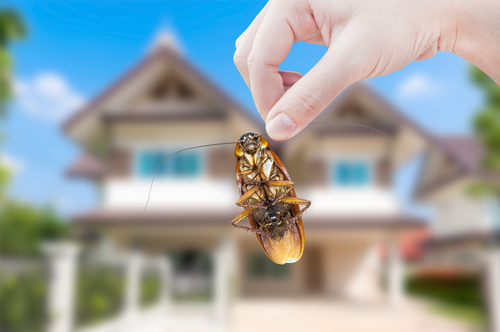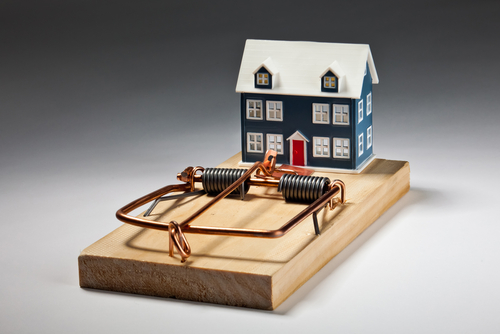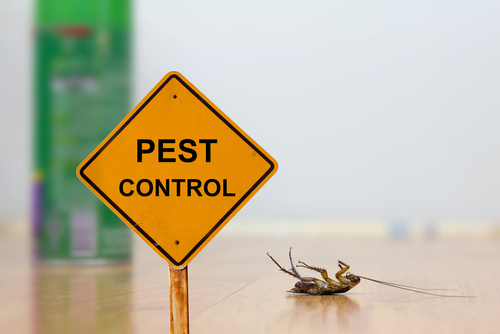Preventing Pest Problems in Rental Properties
No landlord wants to deal with pest problems in their rental homes. However, preventing infestations and managing pest control are major parts of a landlord’s job. Pest problems that go ignored can worsen and create more extensive issues, including health complications.
As a landlord, it’s essential to set clear expectations in the lease regarding pest control. Most of the time, it’s the landlord’s job to maintain a clean environment until a tenant rents out the property. Then, after the lease is signed, it’s the tenant’s job to maintain cleanliness and avoid pest problems in the rental.
Unfortunately, pest problems can pop up when you least expect them to. Continue reading as we go over common pest issues, how to tell if you’re having pest problems, and how to control pests this winter.
Pests Commonly Seen in Rental Properties
 Many pests could invade your home, depending on where you live. The most common pests seen in Montgomery County rental properties include:
Many pests could invade your home, depending on where you live. The most common pests seen in Montgomery County rental properties include:
- Rats
- Mice
- Ants
- Bedbugs
- Fleas
- Cockroaches
- Spiders
You may not always see them in plain sight during the day, but that doesn’t mean they aren’t around. Mice and rats hide along interior walls, deep in kitchen cabinets, or behind large appliances. In addition, ants may be found underneath appliances or near food sources.
Other insects and pests are found in similar places, usually in dark, secluded home areas. So next, let’s go over some of the signs of pest problems in your rental home.
How Can You Tell If You Have Pest Problems?
Since pests can hide out without being seen regularly, it can sometimes be hard to tell when you have an infestation. That said, the signs of significant pest problems can be hard to miss. If you are experiencing the following signs of pest infestation, it’s time to take action:
- Pest Droppings- Pest droppings and urine trails can be hard to spot. However, this is one of the easiest ways to determine if you have a pest problem. You’ll likely find waste from bed bugs or roaches along walls, in bedding, and on furniture.
- Rodent Nests- Rodents tend to make nests out of any materials they can find. Paper, leaves, and other scraps are useful for making rodent nests. To prevent rodent infestations in your rental home, regularly inspect common nesting areas.
- Property Damage- Most rodents love to chew. Similarly, other insects may also chew and leave damage to wires, wood cabinets, and more. If tenants notice unexplained damage to the property, they should report it right away.
Who is Responsible for Resolving Pest Problems in Rental Properties?
When damage from pest infestation is spotted in your rental property, you must take care of it immediately. But, who is responsible for pest problems—landlords or tenants?
The answer isn’t always straightforward. It depends on many situations and housing factors. Most lease agreements state that tenants are responsible for maintaining the rental home’s cleanliness to avoid pest infestations. That said, the landlord must initially provide a pest-free rental home when the tenant first moves in.
If an infestation occurs once the tenant occupies the home, determining who’s in charge of pest control depends on what type of rental it is. If the house is a single-family rental property, the tenants are in charge of hiring someone to exterminate pests.
However, if the property contains two or more rental units, the landlord is responsible for pest extermination. That said, if the pest problems occurred from tenant negligence, they might be accountable for damages.
Why is Pest Control Necessary in Rental Homes?
Keeping a well-maintained rental property is essential for both tenants and landlords. However, having pests in your rental home can cause various issues. Now that we’ve determined who is responsible for pest control in certain scenarios, let’s go over why it’s so important.
- Tenant Safety and Health
- Rental Property Damages
- Tenant Complaints
- High Turnover Rates
Tenant Safety and Health
Some pests, like rodents, can spread diseases throughout the home, creating respiratory problems and other issues. In some cases, it may affect the habitability of your rental home. That said, any signs of pest problems should be reported and taken care of immediately.
Rental Property Damages
Damages from pests can occur very easily. Termites, rodents, roaches, and ants can do more damage to your rental than you may think. Some damages that indicate you may have an infestation include holes in walls, chewed wires, and signs of nesting in your rental property.
Tenant Complaints
Building a strong, positive reputation is essential for rental business owners. That said, nobody wants to be known as the landlord with pest infestations. Or worse—a landlord that risks their tenant’s safety. Tenants want to live in a safe and healthy environment, so they may start to complain if they experience pest problems.
Worst case scenario, tenants may start to leave negative online reviews. These days, technology is helpful for most things, including finding a landlord with a good reputation. Unfortunately, it’ll be hard to find quality tenants if you have negative online reviews about your rental properties.
High Turnover Rates
Nobody wants to live in a rental home that has pest problems. That said, issues that arise within the property must be taken care of promptly by landlords. Landlords that neglect pest issues will likely experience high turnover rates. If you can’t find tenants to occupy your rental home, your rental business may start to decline.
How to Control Pests in Your Rental Property This Winter
Now that winter is finally upon us, it’s time to think about pest control during colder months. Since you may see different pests during different parts of the year, it’s essential to look for seasonal pests.

During the winter, a lot of pests look for warmth in Montgomery County rental properties. You may see mice, rats, spiders, and cockroaches looking for warmth during colder seasons. To combat any pest problems, landlords should take the following actions:
- Regular Property Inspections- Landlords should schedule regular visits with rental property inspectors to ensure no pest infestations occur.
- Prevention Treatments- Pest control specialists may detect issues before they occur, preventing future infestations.
- Seasonal Maintenance- Pests that infest rental homes may differ depending on the season. Landlords should keep up with seasonal maintenance and schedule pest control visits accordingly.
- Build Relationships with Vendors- Landlords should build a good relationship with vendors and staff members to learn about pest infestations and how to prevent them.
- Take Action Promptly- As soon as there is a sign of infestation, landlords and tenants should work together to fix it immediately. Waiting for pest problems to be fixed may cost you money with each passing minute.
Need Help Protecting Your Rental Property From Pest Damages?
If you own one or more rental properties, the day-to-day tasks can seem never-ending. That said, running into a pest infestation is something that no landlord wants to deal with.
Luckily, Bay Property Management Group offers a full-service approach to property management in Philadelphia and surrounding continues.
Whether you need assistance with tenant screening, maintenance requests, or rent collection, our dedicated team of professionals is here to help every step of the way. If you need help with your rental property business, reach out to Bay Property Management Group today.

